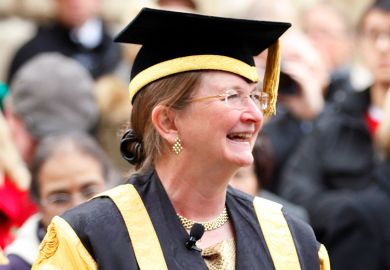One of the UK’s smallest universities paid its vice-chancellor £808,000 in her final year in the job, including a £429,000 pay-off on her departure, Times Higher Education can reveal.
Christina Slade, who was vice-chancellor of Bath Spa University until August 2017, was paid a salary of £250,000 in 2016-17, but received an additional £429,000 as “compensation for loss of office”, the university’s latest financial statements show.
Professor Slade, who had led Bath Spa since September 2012, also received a housing allowance of £20,000, other benefits-in-kind worth £20,000 and pension contributions of £89,000 last year, which took her overall remuneration package to £808,000.
It means that the 64-year-old Australian academic was almost certainly the UK’s highest paid vice-chancellor in 2016-17 – with her overall pay package almost 75 per cent higher than the £468,000 in pay and benefits awarded to Dame Glynis Breakwell, the University of Bath’s vice-chancellor, that year. Most universities have yet to publish their annual financial statements that contain details of executive pay.
News of Professor Slade’s pay-off – believed to be a record for a UK university – is likely to intensify calls for further scrutiny of university vice-chancellors’ pay. An independent inquiry into “excessive vice-chancellor pay” should be set up and report back to the Prime Minister by the end of January, said the Labour peer Lord Adonis in a tweet on 5 December.
Last week it emerged that Sir Christopher Snowden, vice-chancellor of the University of Southampton, became one of the UK’s most highly paid higher education leaders in 2016-17, on a remuneration package totalling £433,000. This is in comparison with the £352,000 that he was paid the previous year for the 10 months that he was employed, and comes after the institution announced plans to axe 75 academic jobs.
A Bath Spa spokeswoman said that Professor Slade, a professor of media theory, had “stood down” as vice-chancellor last summer after “more than five years of distinguished service” and, after taking legal advice, the university paid her “a sum which reflected her contractual and statutory entitlements and was considered to represent value for money”.
The university, which had 7,300 students in 2016-17, added that “relevant Higher Education Funding Council for England guidance was taken into account and legal advice, based on this guidance, obtained” before the sum was paid. In June, Hefce warned that enhanced severance packages “should not as a rule be provided out of public funds” and must not reward poor performance.
The Bath Spa spokeswoman added that its remuneration committee, which does not include the vice-chancellor, was “mindful of the need to respond to concerns about excessive salaries”.
However, the committee also took into account the “performance of the university in meeting key performance indicators, the individual contribution of senior staff to achieving the university’s strategic objectives, the need for the university to be competitive in the higher education market, affordability and reputation”.
The university also stressed that, under Professor Slade’s five-year tenure, it had “become one of the UK’s leading creative universities".
However, the university’s latest financial statements record a number of “challenges”, despite its “strong financial performance” and “record intake” of 2,300 UK and other European Union students in 2016-17. In September 2017, its international student numbers dropped by 30 per cent and overall domestic and EU intake dipped to 2,100, while two subsidiary companies – Bath Spa U and Bath Spa Global – racked up significant losses, the accounts note.
Figures available on Companies House show that Bath Spa Global – an international pathway college venture set up in 2014 in partnership with US firm Shorelight Education – has lost about £1.4 million in the three years to July 2016, while its parent company Bath Spa U has lost about £736,000 over the same period. Professor Slade was a director of Bath Spa U until August 2017. The university’s chief operating officer, Neil Latham, a former British Navy rear admiral, is also listed as a director of Bath Spa U, whose losses caused the university to write off £450,000 last year, the accounts show.
Sally Hunt, general secretary of the University and College Union, said: “We are seeing what happens when decisions are taken in secret without proper checks and balances.
“This cannot be allowed to continue; we need an urgent overhaul of how senior pay and perks are determined, and how our universities are governed.
“Hefce has already been asked to investigate the golden goodbye on offer down the road at the University of Bath and I presume they will look at this one as well. We need students and staff to have a role on the committees taking these decisions and we need to see the full minutes so we can be clear about how pay awards are decided.”
Register to continue
Why register?
- Registration is free and only takes a moment
- Once registered, you can read 3 articles a month
- Sign up for our newsletter
Subscribe
Or subscribe for unlimited access to:
- Unlimited access to news, views, insights & reviews
- Digital editions
- Digital access to THE’s university and college rankings analysis
Already registered or a current subscriber?






